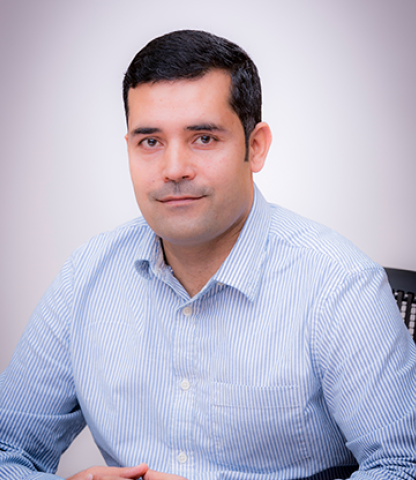FACULTY BIOGRAPHIES

Dr. Gowher Ali
Biography
Dr. Gowher Ali obtained BS (Hons.) degree in Biotechnology from University of Malakand, Pakistan and his Master’s (M2) from the University of Strasbourg, France. During his Master’s, he worked on the team of Dr. Wasylyk Bohdan in the Institute du Génétique et Biologie moléculaire et cellulaire (IGBMC). For his doctoral program, Dr. Ali joined the team of Dr. Ivan Tarassov and received his PhD degree from the University of Strasbourg in 2013. During this period, he worked on the mechanism of endogenous (5S rRNA and RNase MRP) and synthetic therapeutic RNA import into human mitochondrial. He investigated the role of protein factors (preKARS2, Enolase, PNPase) in the targeting and translocation of RNA into human mitochondria. He also studied the effect of a pathogenic point mutation in polynucleotide phosphorylase (PNPase) protein, on the mitochondrial RNA import in patient fibroblasts.
In 2014, Dr. Ali joined the team of Dr. Meng How Tan, in the Genome Institute of Singapore (A*STAR), where he studied the role of Wnt signaling transcription factors during stem cell pluripotency and differentiation into Dopamine neurons. He generated the CRISPR-Cas9 mediated knockout of transcription factors involved in Wnt signalling pathway i.e. TCF7, TCF7L1, TCF7L2 and LEF1. He performed the RNA-Seq in TCF7L2 KO cells and CHIP-Seq for TCF7L2 in ESC, Dopamine progenitor and mature neurons to understand the subset of genes regulated by TCF7L2 during stem cell differentiation into Dopamine neurons.
Dr. Ali also participated in a number of other projects like Chemical inducible CRISPR-Cas9 system, CHIP-Seq for H3K9Ac and H3K14Ac in Saccharomyces cerevisiae and development of HEK293 cell lines, for efficient production of therapeutic proteins. Dr. Ali has experience in mitochondrial biology, stem cell biology and differentiation, CRISPR-Cas9 mediated genome editing and sample preparation for high throughput sequencing. Dr. Ali joined Dr. Abdelalim’s team in April 2018, where he will work on patient-derived induced pluripotent cells (iPSCs), embryonic stem cells (ESCs), CRISPR-Cas9 mediated genome editing and high throughput sequencing approaches to study the molecular mechanism underlying diabetes and pancreatic beta cell development. Dr. Ali has been hired under NPRP grant funded by QNRF (NPRP9-283-3-056).
Selected Publications
-
Liu KI, Ramli MN, Woo CW, Wang Y, Zhao T, Zhang X, Yim GR, Chong BY, Gowher A, Chua MZ, Jung J, Lee JH, Tan MH.
A chemical-inducible CRISPR-Cas9 system for rapid control of genome editing. Nat Chem Biol. 2016 Nov;12(11):980-987.
2016 -
Baleva M, Gowher A, Kamenski P, Tarassov I, Entelis N, Masquida B.
A Moonlighting Human Protein Is Involved in Mitochondrial Import of tRNA. Int J Mol Sci. 2015 Apr 24;16(5):9354-67.
2015 -
Gowher A, Smirnov A, Tarassov I, Entelis N. Induced tRNA import into human mitochondria:
implication of a host aminoacyl-tRNA-synthetase. PLoS One. 2013 Jun 14;8(6): e66228.
2013 -
Vedrenne V, Gowher A, De Lonlay P, Nitschke P, Serre V, Boddaert N, Altuzarra C, Mager-Heckel AM, Chretien F, Entelis N, Munnich A, Tarassov I, Rötig A. Mutation in PNPT1,
which encodes a polyribonucleotide nucleotidyltransferase, impairs RNA import into mitochondria and causes respiratory-chain deficiency. Am J Hum Genet. 2012 Nov 2;91(5):912-8.
2012 -
Pubmed link: https://www.ncbi.nlm.nih.gov/pubmed/?term=Gowher+Ali
